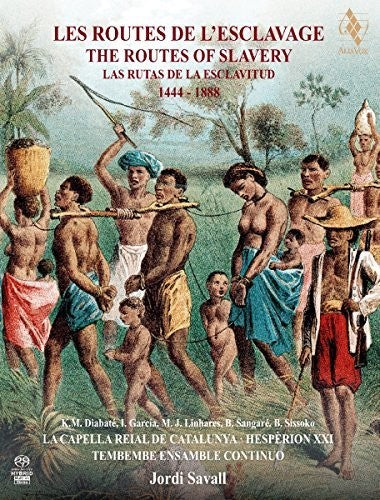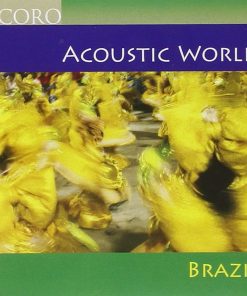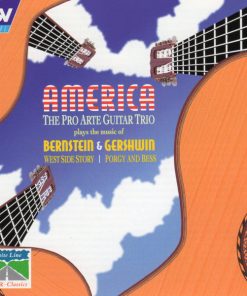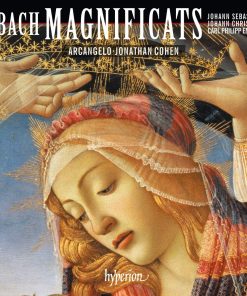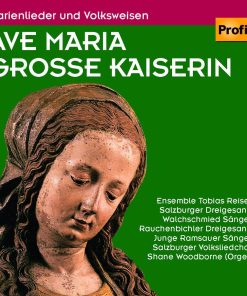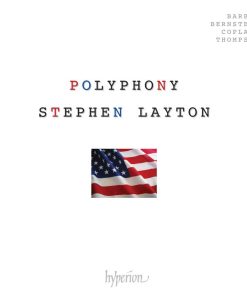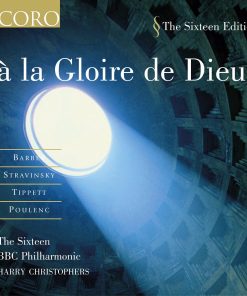The Routes Of Slavery 1444-1888 (3 CDs) ALIA VOX
$ 54,99 $ 27,50

We firmly believe that the advantage of being aware of the past enables us to be more responsible and therefore morally obliges us to take a stand against these inhuman practices. The music in this programme represents the true living history of that long and painful past. Let us listen to the emotion and hope expressed in these songs of survival and resistance, this music of the memory of a long history of unmitigated suffering, in which music became a mainspring of survival and, fortunately for us all, has survived as an eternal refuge of peace, consolation and hope.
A homage to the memory of victims of the slave trade.
This new multicultural project from Jordi Savall and his musicians on The Routes of Slavery (1444-1888) marks a world first in the history of music and of the three continents involved in the trade in African slaves and their exploitation in the New World, which are brought together through the early music of the colonial period, the musical traditions of Mali and the oral traditions of the descendants of slaves in Madagascar, Brazil, Colombia and Mexico. This ‘Musical Memoir’ is accompanied with historical texts on slavery, beginning with the early chronicles of 1444 and concluding with texts written by the Nobel Peace Prize-winner Martin Luther King shortly before his assassination in 1968.
Sponsored by UNESCO, this musical reconciliation is founded on equality, harmony and reciprocal inspiration, constituting the commemoration of a tragic and shameful chapter in the history of mankind. A vast historical and musical fresco, which throws light on the West’s attitude towards Africans in Latin America, the United States and Europe, as well as its indifference towards that ‘forgotten’ continent of Africa. But it is also a joyful celebration of hearts and spirits united through music and dance, offering us all a vital source of survival, a refuge of peace, consolation and hope.
2 hybrid SACD + 1 DVD filmed live at the Fontfroide Abbey (France) PAL zone 0
Booklet : English, French, German, Italian, Castillian, Catalan

Les Routes de l’Esclavage
1444-1888
CD1
1. Récit : 400. av. J.C. Aristote. L’humanité est divisée en deux : Les maîtres et les esclaves. 1’11
2. Récit : 1444. La première cargaison africaine, avec 235 esclaves, arrive à l’Algarve. 4’12
3. Djonya (Introduction) Kassé Mady Diabaté voix 1’23
4. La Negrina / Gugurumbé – M. Flecha, l’ancien & Los Negritos – Son jarocho 5’03
5. Vida ao Jongo (Jongo da Serrinha) – Lazir Sinval (Brésil, trad. africaine) 2’31
6. Récit : 1505. Le roi Ferdinand le Catholique écrit une lettre à Nicolas de Ovando. 1’30
7. Tambalagumbá (Negrilla à 6 v. et bc.) – J. Gutiérrez de Padilla (Mss. Puebla, 1657) 5’09
8. Velo que bonito (ou San Antonio) – Traditionnel (Colombie) 2’45
9. Manden Mandinkadenou – (Chant griote) K.M. Diabaté, Choristes, LCRdC & Ensemble 3M 4’41
10. Récit : 1620. Les premiers esclaves africains arrivent dans les colonies anglaises. 3’10
11. Canto de Guerreiro (Caboclinho paraibano) – Traditionnel / Erivan Araújo (Brésil) 3’51
12. Kouroukanfouga (instr.) – Anonyme (Mali) Ensemble 3M 5’15
13. Récit : 1657. Les musiques des esclaves. R. Ligon Histoire…de l’Île de la Barbade. 2’09
14. Son de la Tirana : Mariquita, María – Trad. (Costa Chica de Guerrero, Mexique) 2’54
15. Antoniya, Flaciquia, Gasipà (Negro à 5) – Fray Filipe da Madre de Deus 7’22
16. Récit : 1661. Les Châtiments des esclaves. Hans Sloane, A voyage to the islands. 3’20
17. Sinanon Saran (Chant griote) Kassé Mady Diabaté voix, Choristes, LCRdC & & Ensemble 3M 3’41
CD2
1. Récit : 1685. Le « Code Noir » promulgué par Louis XIV s’est imposé jusqu’à 1848. 2’30
2. Los Indios : ¡Fuera, fuera! ¡Háganles lugar! – Roque Jacinto de Chavarría 5’50
3. Saí da casa (Ciranda) – Traditionnel / Escurinho (Brésil) M.J. Linhares & Hespèrion XXI 4’32
4. Récit : 1748. Montesquieu De l’Esprit des lois. XV, 5 : « De l’esclavage des nègres » 1’11
5. Véro (instrumental) – Anonyme (Madagascar) Ensemble 3M 8’36
6. El Torbellino – Traditionnel (Santander de Quilachao, Colombie) 3’08
7. Gulumbé : Los coflades de la estleya – Juan de Araujo (La Paz, Fortún) 5’02
8. Récit : 1782. Requête de l’esclave Belinda, devant le Congrès du Massachusetts. 3’49
9. Simbo (Chant griote) Kassé Mady Diabaté voix, Choristes, LCRdC & Ensemble 3M 5’26
10. La Iguana (Son jarocho) – Traditionnel (Veracruz, Mexique) 4’02
11. Récit : 1848. Décret sur abolition de l’esclavage, dans toutes les colonies françaises. 2’11
12. Tonada El Congo : A la mar me llevan – Anonyme, Codex Trujillo (Pérou, s. XVIII) 3’48
13. Bom de Briga (Maracatu e Samba) – Traditionnel / Paolo Ró & Águia Mendes (Brésil) 3’10
14. Récit : 1963. Martin Luther-King « Pourquoi nous ne pouvons pas attendre ». 2’33
15. Touramakan (Chant griote) Kassé Mady Diabaté voix, Choristes, LCRdC & Ensemble 3M 5’20
16. Guaracha : Ay que me abraso – Juan García de Zéspedes 5’14
Fast Shipping and Professional Packing
Due to our longstanding partnership with UPS FedEx DHL and other leading international carriers, we are able to provide a range of shipping options. Our warehouse staff are highly trained to pack your goods exactly according to the specifications that we supply. Your goods will undergo a thorough examination and will be safely packaged prior to being sent out. Everyday we deliver hundreds of packages to our customers from all over the world. This is an indication of our dedication to being the largest online retailer worldwide. Warehouses and distribution centers can be located in Europe as well as the USA.
Orders with more than 1 item are assigned processing periods for each item.
Before shipment, all ordered products will be thoroughly inspected. Today, most orders will be shipped within 48 hours. The estimated delivery time is between 3-7 days.
Returns
The stock is constantly changing. It's not entirely managed by us since we are involved with multiple parties such as the factory and our storage. The actual stock can fluctuate at any time. Please understand it may happen that your order will be out of stock when the order is placed.
Our policy is valid for 30 days. If you haven't received your product within 30 days, we're not able to issue either a return or exchange.
You are able to return a product if it is unused and in the same condition when you received it. It must also still remain in the original packaging.
Related products
MUSIC CD
MUSIC CD
MUSIC CD
MUSIC CD
